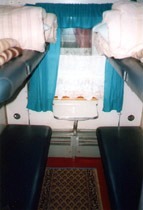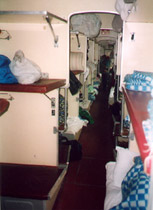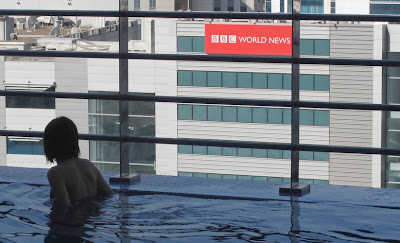My dad recently sent me photos of the deluxe observation cars on his railway travels in Alaska. I wish the Trans Siberian railway had such good observation cars – or observation. Outward visibility is one of the main problems (after the fact my compartments have been like saunas). I've been in ‘Kupé’ class compartments containing four bunks and one window. When the door is closed I can only see out one side, which on most of my five Kupé trains (which exclude the high speed Siemens deluxe intercity train from St. Petersburg to Moscow) has been to the north side, which is not the side with the kilometre markers. I have had the top bunk four times out of five and I prefer this because it gives me more of my own space. But it's even harder to see from the top bunk because the window doesn't extend high enough so you have to either lie on your chest and bend your neck or get into other contortions to see out.
The alternatives are the corridor windows, or a little window at near the toilet which is sometimes not locked. That window is the main point for fresh air – the problem with the vestibule (through another door) is that it smells like a cloud of smoke if people are there or, worse, an ashtray if they’re not. The freshest air is in the passage between the carriages but that’s not practical because there are inter-sliding floor plates, dangerous holes, terrific noise, and there is no room for people to pass you.
I have just inspected, on my last segment, the Platskartny class carriages. These are more open bunk arrangements – still with groups of four bunks but another pair along the opposite window and no doors or walls in between. (I think at least the transverse bunks must be shorter – and my Kupé bunk isn't long enough for my 168cm - because they also have to fit the width of the longitudinal bunks into the train.) When I travel on Russian trains again I will go with the Platskartny class because it will be easier to see out both sides, because I think the camaraderie looks more fun and because it will cost less.


Unfortunately I did not properly photograph my compartment. Kupé compartment (left) and Platskartny carriage - photos from The Man in Seat Sixty-One.
Despite mentioning that I would like to be able to see out more easily, the natural landscape has been the only big disappointment of my trips. Ninety five percent of the route has been uninteresting to look at. It reminds me of the interior of British Colombia, both for being boring, and for being less than I’d expected. The exceptions in Russia were near Lake Baikal where there was some relief (I use the word in both meanings). I learn too late from my guidebook that the really good scenery is on the Baikal-Amur Mainline route.
The cultural landscape, on the other hand, has exceeded my hopes. Fantastically fascinating. Settlements from towns up to cities display a lot more Soviet legacy than I’d expected. I haven’t been able to ask anybody but my feeling is that the Lenin statues and local hero statues have faded into the invisible landscape that nobody would bother to erase. Hammer and sickle ornaments cast iron bridge railings would take a lot of resources to replace. What I haven’t been able to measure is the emotional side. Would Russians tear Lenin down more often if it were easy, or do they miss the guaranteed health, education and employment that he promised and generally delivered? (Russia remains a very socialist country and the health care and education are still essentially guaranteed.)
The smaller settlements don’t display any political position I can decode. I shared my Kupé compartment from Moscow to Yekaterinburg with an American who has lived here for ten years. He confirmed my suspicion that they were changed no more by the transition from Communism to the free market as they had been by the Russian Revolution. They seem to concentrate more on survival. Some of them are on permafrost and one at least has to cope with a total annual temperature range of 110°C.
Having had eight nights in Kupé compartments I’m now pretty familiar with the routines. I have been paying for a daily meal (although it didn't seem to arrive on my last full day). One of the dining car staff comes mid-morning to ask what you want. I can never understand much of this dialogue but it involves the words ‘rice’ or ‘puré’ (mashed potato) and at least once involved the international sign signal for beef. (This is indicated with fingers representing horns. The international sign signal for chicken is wagging arms.)
The selected meal will arrive within a few hours. Companions who selected more cleverly will be served as much as an hour earlier because all the servings of their choice are prepared first. The rest of the meals are self-managed and the options are the dining car, when it deigns to be open, or fast food from station platforms, supermarkets near stations, or, theoretically, restaurants in stations. I have not tried the last option because there has so rarely been time.
Regarding the dining car, it may be a privatized concession but it still seems a bit Soviet to me. There are normally more staff than customers and they are all busy checking and rechecking the inventory and there is a distinct impression that any sale would impose a lot of extra stock management. What I don’t understand is what happened to the profit motive – it certainly doesn’t seem to have reached the staff. My chief disappointment about the dining cars is that there is none of the (drunken) atmosphere I’d expected from movies. I imagined I’d be sharing endless rounds of vodka but there’s almost nobody to do it with.

Yekaterinburg to Irkutsk dining car.

Blagovenshchensk to Vladivostok dining car.
A confusion, which is actually not a confusion, is the complete use of Moscow time. When I’d read about this I thought it was political Moscow centralism. All timetables (except for local commuter trains) refer to Moscow time. Clocks in trains and train stations across the country show Moscow time. As I ride in my seventh and last time zone (nearing Vladivostok) I can see that this is the most practical method. Perhaps it would never go down well in Canada, Australia or the US (the other countries where I have ridden transcontinental trains) but it’s the best way here. I’ve kept my watch on Moscow time and it makes interpreting the onboard timetables very simple, particularly as most of the time the trains arrive and depart at the scheduled minute. In my case my train to Blagoveshchensk lost two hours in the middle of the second night and never caught up, but others maintain the schedule to the minute day in day out. The Lonely Planet guide explains that train managers get bonuses for on-time performance – and that the schedules are set very conservatively to make this possible. I wish the on-board timetable would list the kilometre marks (distance from Moscow) at each scheduled stop. Because I often wanted to know when to be awake to see something mentioned in the Lonely Planet I was always having to cross reference my Moscow-watch, the kilometre marks mentioned in the guidebook, the timetable, and the difficult-to-glimpse kilometre marks beside the track. It must be so much easier for the thousand other passengers who don’t care.
Please see my (growing) Russia Photos pages here.


















































